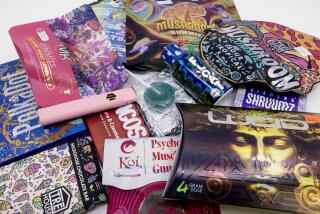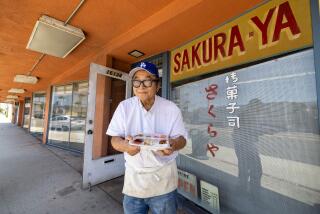At $80 Per Mushroom, Price for Matsutake Is High Even for the Japanese
- Share via
TOKYO — In the land of $7 apples and $6 boxes of granola, matsutake mushrooms are in a class of their own.
Japanese drop their usual tones of careful politeness and become positively rapturous in describing these unassuming brown fungi, their woodsy taste and piney smell.
The owner of one of the world’s most exclusive restaurants, Kicho, where meals can run $800 a person and only an introduction from a previous customer can win a reservation, recently wrote: “In autumn we can almost not do our business without matsutake .”
But for the uninitiated, it is the price tag of the matsutake , or pine-tree mushrooms, that is so breathtaking: a few inches high and, in fact, rather mushroom-like in appearance, a single well-shaped matsutake can cost as much as $80; even an average one will run $40 per stem.
Matsutake are so pricey and so prized that matsutake fraud has now entered the Japanese lexicon. Recently it was discovered that some of these mushrooms were being sold with tiny lead slivers inserted in their stems to inflate their weight and thus their asking price.
Worth It to Japanese
For the Japanese, who adore all manner of mushrooms and use about half a dozen different varieties in their everyday food, the price is clearly worth it. “I love them,” a Japanese newspaper editor said recently, as he dropped the subject at hand--stock market manipulation--to wax eloquent about matsutake .
A Japanese folk saying sums up the emotionalism toward matsutake : “The mountain where you picked matsutake cannot be forgotten.”
With this saying in mind, a farming community troubled by a high rate of bachelorhood among its young men recently held a matsutake -picking party in an effort to entice women back to the farm.
According to mushroom connoisseurs, matsutake are expensive because their season is short--just a few weeks in late fall--and because they can grow only in the wild. Japan’s wilderness has been disappearing steadily in the face of relentless urbanization, and the red pine trees around which matsutake flourish have also been diminishing.
Not Domesticated Yet
The finest scientists have failed so far to domesticate the matsutake on a mass scale, despite repeated efforts. Mie Ogoshi of Japan’s Tsuji Cooking School said that matsutake were much more common and much cheaper 20 years ago and were used liberally in the kitchen. Now, however, they are rationed parsimoniously: paper-thin slices in a special broth, a few bits mixed in a rice dish or a few grilled with a touch of lime and soy sauce. One special soup features a little matsutake with a touch of real gold shavings.
Demand for matsutake is so strong that the import-resistant Japanese have turned to South Korea and China, where matsutake also grow and cost much less.
Mushroom aficionados insist that these imports do not taste as good as local ones; among other drawbacks, to satisfy customs inspectors the matsutake must be washed well, which attenuates their aroma, they say. Nonetheless, every fall, die-hard matsutake lovers figure that it is worth the price of a Tokyo-Seoul round-trip ticket (about $500) to fill a few boxes with fresh Korean matsutake and lovingly carry them home.
Still, even in affluent Japan, there are many who find $80 per mushroom a bit rich for the blood. One Japanese woman who raved about the taste and autumnal smell of matsutake admitted, after calming down, that she had not bought one in 15 years.
‘Like They Are Gold’
“When you look at the price tag on the matsutake , it is like they are gold,” acknowledged Ogoshi, of the cooking school. And like many high-priced foods in Japan, including the beautiful cantaloupe grown here and sold, individually wrapped, for $80 or more, matsutake most often are given as presents.
For those who love their matsutake but cannot afford them, one enterprising Japanese company recently developed “essence of matsutake ,” a small vial of which costs only $2.50. The liquid can be poured on top of the lowly shiitake or ma-shu-ru-mu (white American-style mushroom), allowing the diner to imagine it is the real thing.
For the truly desperate, stores sell a few slices of matsutake for the comparatively reasonable price of $20. When sniffed very closely they do give off a piney odor. Cooked--one minute in a hot broiler or over a fire, with drop of a little lime juice--they taste, well, like a mushroom.
More to Read
Eat your way across L.A.
Get our weekly Tasting Notes newsletter for reviews, news and more.
You may occasionally receive promotional content from the Los Angeles Times.










